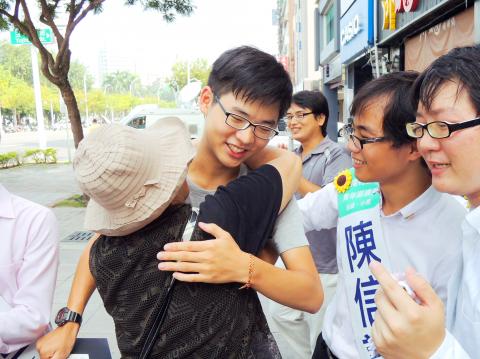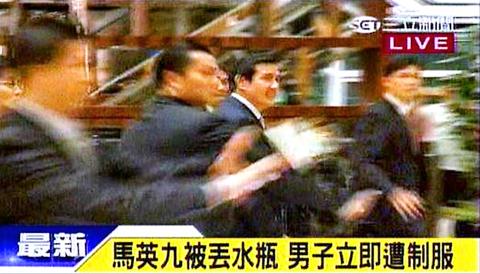The National Security Bureau (NSB) yesterday acknowledged lapses in the handling of security for President Ma Ying-jeou (馬英九) after he was hit by a book thrown by a political activist a day earlier.
The bureau said security lapses have been found among its staff and military police officers, who were responsible for the safety of the president as he attended a reception for international franchise chains in Taipei’s Neihu District (內湖).
The bureau said it would take punitive action against those responsible for the oversights, according to a statement it issued after an internal meeting on the incident.

Photo: Wang Jung-hsiang, Taipei Times
Local media outlets reported that up to 10 people were being disciplined.
Although the bureau had gone over Friday’s security arrangements on site and possessed related intelligence, it still failed to prevent the protester from throwing the book, it said.
A group of NSB personnel who failed to protect the president have been replaced, the bureau said, adding that it would improve measures to ensure the president’s safety.

Photo: CNA
The bureau said that it respects the public’s right to peacefully express their opinions, but people must not break the law and resort to illegal acts.
When Ma arrived at a Denwell banquet venue on Friday for an event hosted by the International Franchise Association, several hundred people were at a fundraiser for the pro-independence Northern Taiwan Society downstairs.
The incident occurred as Ma was preparing to leave the building after the reception.
A group of reporters were waiting to ask him for his response to Chinese President Xi Jinping’s (習近平) advocacy of a “one country, two systems” formula when a man in a black shirt threw a book from the media area.
Shouting: “Taiwan and China, one country on each side,” he hurled the book Formosa Betrayed, hitting Ma in the torso.
Several security agents immediately pinned a man later identified as Yen Ming-wei (顏銘緯) to the ground. Yen was heard continuing to yell: “Taiwan and China, one country on each side,” while being tackled.
Police asked him to leave the venue after identifying him.
Yen is a freshman at National Sun Yat-sen University and director of Greater Kaohsiung-based activist group Flanc Radical’s electoral campaign in Greater Kaohsiung.
“This is my way of responding to what Ma said [in] the Deutsche Welle [report],” Yen said, referring to Ma’s misreported praise of German unification as a possible model for China-Taiwan relations in a recent report by the German radio station.
The station has since corrected its erroneous report and clarified what the president said.
Yen threw Formosa Betrayed, written by former US diplomat George Kerr about Taiwan’s transition from Japanese rule as well as the 228 Incident and the White Terror era during Taiwan’s authoritarian period under the Chinese Nationalist Party (KMT).
Yen first gained attention after he mobilized a large number of students from southern Taiwan to join the Sunflower movement in Taipei earlier this year.
At 18, he is also thought to be the youngest election campaign director in Taiwan.
Yen said he was visiting friends at the Northern Taiwan Society fundraiser when he found out that Ma was in the same building.
“I did not come here with a plan. I just bought the book on the spot from an NTS stand,” he said.
Police later dragged Yen away from Ma and cornered the student near the entrance of a restroom. Seeking help, Yen called his friends at the NTS event downstairs, who sent legal experts to his aid.
Lai Chung-chiang (賴中強), lawyer and member of the Democratic Front Against the Cross-Strait Trade in Services Agreement, and Democratic Progressive Party spokesperson Huang Di-ying (黃帝穎), who is also a lawyer, happened to be at the NTS event and immediately offered legal advice to Yen.
“The police were threatening Yen by saying that he had already been arrested, which simply could not be true,” Lai said.
Regarding the legality of hurling a book at the president, Lai said: “If the book actually hurt someone, it would be an offense of causing injury (傷害罪). However, such a case would require the victim to press charges before police action can be taken.”
Lai said the group was about to leave with Yen, but several police refused to let them go.
Jostling between the two parties ensued.
Lai’s secretary, Chen Guan-yu (陳冠宇), said he was trying to help Lai and Yen leave when he was pinned to the ground by a police officer who accused him of “assaulting police.”
“I really did not hit anybody. I was just trying to stand between the police and lawyer Lai,” Chen said, adding that he received minor injuries on his neck.
Taiwan Association of University Professors president Lu Chung-chin (呂忠津) also joined negotiations at the scene.
“In the end, everybody just realized the need to calm down,” Lu said. “They probably also thought the incident was not worth all the fuss. They just asked Yen to leave some identification information and let him go.”
After the incident, Presidential Office spokeswoman Ma Wei-kuo (馬瑋國) said the president respects the rights of the public to express their views rationally, but any form of violence should be condemned.

Intelligence agents have recorded 510,000 instances of “controversial information” being spread online by the Chinese Communist Party (CCP) so far this year, the National Security Bureau (NSB) said in a report yesterday, as it warned of artificial intelligence (AI) being employed to generate destabilizing misinformation. The bureau submitted a written report to the Legislative Yuan in preparation for National Security Bureau Director-General Tsai Ming-yen’s (蔡明彥) appearance before the Foreign Affairs and National Defense Committee today. The CCP has been using cognitive warfare to divide Taiwanese society by commenting on controversial issues such as Taiwan Semiconductor Manufacturing Co’s (TSMC, 台積電) investments in the

INVESTIGATION: The case is the latest instance of a DPP figure being implicated in an espionage network accused of allegedly leaking information to Chinese intelligence Democratic Progressive Party (DPP) member Ho Jen-chieh (何仁傑) was detained and held incommunicado yesterday on suspicion of spying for China during his tenure as assistant to then-minister of foreign affairs Joseph Wu (吳釗燮). The Taipei District Prosecutors’ Office said Ho was implicated during its investigation into alleged spying activities by former Presidential Office consultant Wu Shang-yu (吳尚雨). Prosecutors said there is reason to believe Ho breached the National Security Act (國家安全法) by leaking classified Ministry of Foreign Affairs information to Chinese intelligence. Following interrogation, prosecutors petitioned the Taipei District Court to detain Ho, citing concerns over potential collusion or tampering of evidence. The

‘COMPREHENSIVE PLAN’: Lin Chia-lung said that the government was ready to talk about a variety of issues, including investment in and purchases from the US The National Stabilization Fund (NSF) yesterday announced that it would step in to staunch stock market losses for the ninth time in the nation’s history. An NSF board meeting, originally scheduled for Monday next week, was moved to yesterday after stocks plummeted in the wake of US President Donald Trump’s announcement of 32 percent tariffs on Taiwan on Wednesday last week. Board members voted to support the stock market with the NT$500 billion (US$15.15 billion) fund, with injections of funds to begin as soon as today. The NSF in 2000 injected NT$120 billion to stabilize stocks, the most ever. The lowest amount it

NEGOTIATIONS: Taiwan has good relations with Washington and the outlook for the negotiations looks promising, Minister of Economic Affairs J.W. Kuo said Taiwan’s GDP growth this year is expected to decrease by 0.43 to 1.61 percentage points due to the effects of US tariffs, National Development Council (NDC) Minister Paul Liu (劉鏡清) said at a meeting of the legislature’s Economics Committee in Taipei yesterday, citing a preliminary estimate by a private research institution. Taiwan’s economy would be significantly affected by the 32 percent “reciprocal” tariffs slapped by the US, which took effect yesterday, Liu said, adding that GDP growth could fall below 3 percent and potentially even dip below 2 percent to 1.53 percent this year. The council has commissioned another institution